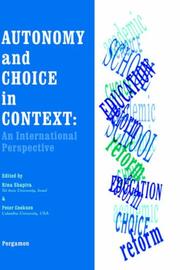| Listing 1 - 5 of 5 |
Sort by
|
Book
ISBN: 1280104562 0203209273 9780203209271 9781135713669 1135713669 9781135713621 9781135713676 9780750707138 9780750706711 0203289161 1135713677 Year: 2003 Publisher: London Falmer
Abstract | Keywords | Export | Availability | Bookmark
 Loading...
Loading...Choose an application
- Reference Manager
- EndNote
- RefWorks (Direct export to RefWorks)
In the 1970's, two events moved education from the control of professionals into the remit of politicians. The book revisits Tyndale and Ruskin, examines their legacy, and argues that questions need to be asked about the nature of the reform.
Education and state --- Education --- Educational change --- School autonomy --- Education, Special Topics --- Social Sciences --- Autonomy, School --- History
Book

ISBN: 2847889736 284788971X Year: 2017 Publisher: Lyon : ENS Éditions,
Abstract | Keywords | Export | Availability | Bookmark
 Loading...
Loading...Choose an application
- Reference Manager
- EndNote
- RefWorks (Direct export to RefWorks)
L’autonomie des établissements scolaires est devenue un thème récurrent des débats éducatifs. On lui prête de nombreuses vertus. Il s’agirait tout à la fois de favoriser les initiatives pédagogiques et de rendre les écoles plus agiles et mieux adaptées à leurs contextes locaux. Cette autonomie fait aussi naître bien des craintes, particulièrement quand elle semble synonyme de développement de logiques concurrentielles. En France, les polémiques sur ce thème présentent alternativement l’autonomie comme une arme « contre » les enseignants ou comme un dispositif qui les « libéreraient ». Plutôt que de s’en tenir à des controverses générales, il a été choisi dans cet ouvrage, d’une part, de mobiliser la littérature internationale et des études de situations dans d’autres pays, et d’autre part, d’aborder une expérience précise d’autonomie pédagogique dans un collège français. En confrontant ces analyses et ces témoignages, ce quatrième opus des Entretiens Ferdinand Buisson propose des pistes opérationnelles pour favoriser les interactions entre recherches universitaires et pratiques professionnelles sur cette question sensible. School autonomy has become a recurrent issue in education. It is credited with many virtues. This would involve both promoting educational initiatives and making schools more flexible and better suited to their local contexts. This autonomy also gives rise to many concerns, especially when it appears to be synonymous with the growth of competition. In France, debates on this subject present autonomy either as a weapon “against” teachers or as a means of “freeing” them. Rather than sticking to common controversies, this book not only includes international literature and case studies from other countries, but also showcases a specific example of educational autonomy in a French secondary school. By comparing these reviews and experiences, this book offers some courses of action for promoting interaction between academic research and professional…
School autonomy --- School management and organization --- Educational equalization --- Autonomy, School --- Education and state --- autonomy --- educational leadership --- school --- decentralisation --- educational projects

ISBN: 1135708916 0203211332 1280406208 0203486994 9780203211335 0750708336 9780750708333 0750708344 9780750708340 9780203486993 9786610406203 6610406200 9781135708917 9781135708863 113570886X 9781135708900 1135708908 9781280406201 Year: 1999 Publisher: London New York, NY Falmer Press
Abstract | Keywords | Export | Availability | Bookmark
 Loading...
Loading...Choose an application
- Reference Manager
- EndNote
- RefWorks (Direct export to RefWorks)
A practical handbook which senior staff in primary schools can use to support their activities in evidence-based management. There is increased emphasis on teachers monitoring the quality of teaching and learning, the Teacher Training Agency's direction is towards teaching as a research-based profession, and there is greater need to assess learning gains and evaluate year-on-year progress in schools. For headteachers, deputy heads, managers, Key Stage coordinators and subject coordinators this book will provide the guidance they need to conduct and act upon quality reviews and evidence- based
Teacher effectiveness --- Elementary school administration --- Elementary schools --- Educational evaluation --- School autonomy --- Autonomy, School --- Education and state --- Grade schools --- Schools --- Middle schools --- School management and organization --- Teacher quality --- Teachers --- Effective teaching --- Evaluation. --- Administration

Abstract | Keywords | Export | Availability | Bookmark
 Loading...
Loading...Choose an application
- Reference Manager
- EndNote
- RefWorks (Direct export to RefWorks)
School management --- School autonomy --- -School choice --- -Choice of school --- Parents' choice of school --- School, Choice of --- Schools --- Education --- Autonomy, School --- Education and state --- Cross-cultural studies --- -Congresses --- Selection --- School choice --- Congresses. --- -Cross-cultural studies --- Choice of school --- Cross-cultural studies&delete& --- Congresses
Book
ISBN: 3428497244 3428097246 Year: 1998 Publisher: Duncker & Humblot
Abstract | Keywords | Export | Availability | Bookmark
 Loading...
Loading...Choose an application
- Reference Manager
- EndNote
- RefWorks (Direct export to RefWorks)
Sowohl in der wissenschaftlichen als auch in der öffentlichen Diskussion stehen Fragen der Umgestaltung des Bildungswesens ganz oben auf der Tagesordnung. Das hat vielfältige Ursachen. Diese gründen sich nicht nur auf den klassischen Zielkonflikt zwischen Effizienz und Gerechtigkeit, sondern reflektieren auch Folgewirkungen des technischen Fortschritts sowie die zunehmende Internationalisierung der Bildungssysteme. Die in der Bundesrepublik Deutschland stattfindende Reformdiskussion folgt damit einem Anpassungszwang des ""Marktes für Humankapital"" an die Gegebenheiten des wirtschaftlichen Wet
Education and state --- Higher education and state --- Education --- School management and organization --- School autonomy --- Finance. --- Autonomy, School --- Children --- Education, Primitive --- Education of children --- Human resource development --- Instruction --- Pedagogy --- Schooling --- Students --- Youth --- Civilization --- Learning and scholarship --- Mental discipline --- Schools --- Teaching --- Training --- Schule --- Bildungsreform --- Bildungsfinanzierung --- Sozialpolitik --- Deregulierung --- Bildungspolitik --- Berufsausbildung
| Listing 1 - 5 of 5 |
Sort by
|

 Search
Search Feedback
Feedback About UniCat
About UniCat  Help
Help News
News